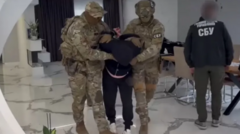As tensions rise in Tbilisi, Georgia, thousands took to the streets early Friday following the government’s decision to suspend its pursuit of European Union membership for four years. The protests mark a significant clash between opposition forces seeking closer ties with the West and the ruling Georgian Dream party's shift towards Russia and China.
Protests Intensify in Georgia as EU Membership Talks Face Suspension

Protests Intensify in Georgia as EU Membership Talks Face Suspension
Thousands demonstrate in Tbilisi against government's decision to halt European Union accession discussions.
The protests ignited after Prime Minister Irakli Kobakhidze announced on Thursday that the EU accession process would be on hold until 2028, along with a rejection of over $500 million in EU grants since 2019. The announcement fueled anger among demonstrators who blocked main avenues, chanting slogans against Russian influence. Riot police responded using water cannons and tear gas to disperse the crowd outside the Parliament building. The internal affairs ministry reported 43 arrests, with 32 officers injured as tensions remain high and protests are expected to continue throughout the week.
Georgia, with a population of 3.7 million, has historically been a battleground for geopolitical interests. The current unrest is rooted in the controversial outcome of the October parliamentary elections, underscoring the nation’s ongoing political crisis.
Georgia, with a population of 3.7 million, has historically been a battleground for geopolitical interests. The current unrest is rooted in the controversial outcome of the October parliamentary elections, underscoring the nation’s ongoing political crisis.





















